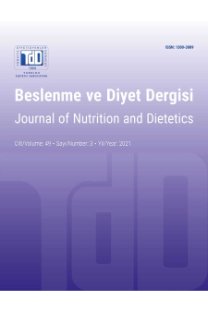Crohn Hastalığında Gelişen Komplikasyonlara Göre Değişen Tıbbi Beslenme Tedavisi: Bir Olgu Sunumu
İnflamatuvar bağırsak hastalıkları (İBH), iki temel formuyla Crohn hastalığı (CH) ve Ülseratif Kolit (ÜK) olup gastrointestinal sistemde kronik, tekrarlayıcı inflamasyona neden olurlar. Bu hastalıklar genetik yatkınlık, çevresel ve immünolojik etmenlerin bir araya gelmesi sonucu, gastrointestinal florayı, barsağın tüm katmanlarını etkileyen, uyumsuz immün yanıtların tetiklendiği inflamatuvar olaylar dizisidir. CH ağız, özefagus, mide, bağırsak ve anüse kadar olan bölgede inflamatuvar aktivitelerle mukozayı etkilerken, ÜK yalnızca kolonik mukozayı etkiler. CH’ın etiyopatogenezi tam olarak anlaşılmamakla birlikte çevresel etmenlerden, sigara, enfeksiyon, apendektomi, emzirme süresi, beslenme alışkanlıkları, ilaçlar, sosyoekonomik etmenler ve stresle ilişkilidir. Bağışıklık sistemde önemli rol oynayan gen mutasyonunun otoimmün hastalıklara ve İBH’a neden olduğu bilinmektedir. Genellikle 15-30 yaş arası görülen CH, fistül, bağırsak tıkanıklığı ve karın içi abse gibi ciddi komplikasyonlar oluşturmaktadır. Hastaneye yatan CH’da %75 beslenme yetersizliği ve ağır mikrobesin ögesi kayıpları görülür, özellikle emilim bozukluğu, intestinal kayıplar, besin metabolizmasındaki değişiklikler, inflamasyon şiddeti, bulantı, kusma, karın ağrısına bağlı tüketimin azalması/gereksinmenin artması, steroidlerin vitamin ve minerallere olumsuz etkisi, GI’in tutulum yeri, hastalıklı barsağın uzunluğu, rezeke edilmesi ve yine hastalığın alevlenme süresi/sıklığı, beslenme yetersizliğine, protein, vitamin, mineral, eser element kayıplarına neden olmaktadır. CH’ın beslenme tedavisi remisyon ve aktif döneme, gelişen komplikasyonlara göre, cerrahi öncesi ve sonrasında değişkenlik arz eder ve dinamik bir süreçtir. Beslenme tedavisinin amacı atakları azaltmak, aktif dönemde vücut bileşimini korumak, makro ve mikrobesin ögeleri kayıplarını önlemek ve yerine koymak, yaşam kalitesini arttırmak olmalıdır. Bu makalede CH tanısı alan bir hastanın gelişen komplikasyonlara göre farklı beslenme tedavi stratejilerinin gerçekleştirildiği olgu tartışılmaktadır.
A Case Report: Changing Medical Nutrition Therapy According to the Complications of Crohn’s Disease
Inflammatory bowel diseases (IBD) are Crohn’s disease (CD) and Ulcerative colitis (UC) with two main form cause chronic, recurrent inflammation in the gastrointestinal tract. These diseases are thesequence of inflammatory events triggered by in compatible immunological responses that affect all layers of the gut, including gastrointestinal flora, genetic susceptibility, consequent taggregation of environmental and immunological factors. CD affects the mucosa by inflammatory activities in there gion as mouth, esophagus, stomach, intestine and anus; while UC affects only colonic mucosa. The etiopathogenesis of CD is not fully understood; smoking, infection, appendectomy, duration of breastfeeding, eating habits, medications, socioeconomic factors and stress are associated with CD. It is known that gene mutation, which plays an important role in the immune system, is caused by auto immune diseases and IBD. CD seen usually between 15-30 years; it makes up serious complications; fistula, intestinal obstruction and intraabdominal abscess. Hospitalized CD has a 75% nutritional deficiency and severe micronutrient losses; especially malabsorbsion, changes in nutrient metabolism, severity of inflammation, nausea, vomiting, increase in requirement’s/decrease in consumption due to abdominal pain, adverse effect to steroids of vitamins and minerals, injury location of GI,resection, length of diseased gut and duration/frequency exacerbation of the diseaes, malnutrition, protein, vitamin, mineral, trace element losses cause by it. The nutritional therapy of CD may change and a dynamic process; according to remission and active rotation, before and after surgery developing complications. Nutritional therapy should be aimed at reducing the attacs, protecting the body composition during the active phase, preventing and replacing macro/micronutrient losses, and improving the quality of life. This article discusses the fact that different nutritional therapy strategies are performed according to developing complications of a CD who has a CD.
___
- Baysoy G. İnflamatuvar barsak hastalıkları. Çocuk Gastroenteroloji, Hepatoloji ve Beslenme 2016;7:81-96.
- Türker FP, Günaldı S. Chron hastalığı ve tıbbi beslenme. Güncel Gastroenteroloji 2016;20(3):267-273.
- Stepanjuk P, Bernstein C, Targownik I, Singh H. Characterization of inflammatory bowel disease in elderly patients: A review of epidomiology, current practices and outcomes of current management strategies. Can J Gastroenterol Hepetol 2015;29(6):327- 333.
- Malazgirt Z, Kamalı A. İnflamatuvar barsak hastalığında beslenme (Eds: Malazgirt Z, Topgül K). Nutrisyon ve gastrointestinal hastalık. 1. Baskı. Nobel Tıp Kitapevleri Ltd. Şti, İstanbul, 2011, s. 59-84.
- Kılıçturgay S. Gastroenteroloji ESPEN enteral nutrisyon rehberi (Eds: Korfalı G, Bahar M). 1.Baskı Kepan Yayınları, 2011, s.73-84.
- Shanahan F. Chron’s disease. Lancet 2002;359(9300):62- 69.
- Reimund JM, Hirth C, Koehl C, Baumann R, Duclos B. Antioxidant and immune status in active Chron’s disease. A possible relationship. Clin Nutr 2000;19(1):43- 48.
- Ünal H, Fırat D. İnflamatuvar hastalıklarında nutrisyon. Güncel Gastroenteroloji 2014;16(2):166-170.
- Akpınar H. Gastroenteroloji ESPEN parenteral nutrisyon rehberi. 1.Baskı. Kepan Yayınları, 2011,s.70-83.
- Forbes A, Escher J, Hébuterne X, Kłęk S4, Krznaric Z, Schneider S, et al. ESPEN guideline: Clinical nutrition in inflammatory bowel disease. Clin Nutr 2017;(36):321- 347.
- Cresci G, Escure A. Medical nutrition therapy for lower gastrointestinal tract disorders. In: Kathleen Mahan L, Raymond J, editors. Krasues’s Food & Nutrition Care Process. 14th ed. Elseiver; 2017. p.525-559.
- Haskey N, Gıbson LD. An Examination of diet for the maintenance of remission in inflammatory bowel disease review. Nutrients 2017;9:259-279.
- Akpınar H. İnflamatuvar barsak hastalığında nutrisyonel destek (Eds: Gündoğdu H). Klinik Nutrisyon Temelleri. 4. Baskı. Pelin Ofset Tipo Matbaacılık San. ve Tic. Ltd. Şti, Ankara, 2013, s. 458-466.
- ISSN: 1300-3089
- Yayın Aralığı: Yılda 3 Sayı
- Başlangıç: 1972
- Yayıncı: Türkiye Diyestisyenler Derneği
Sayıdaki Diğer Makaleler
Erkek İnfertilitesinde Antioksidanların Rolü
Non-Alkolik Yağlı Karaciğer Hastalığı ve Kafein
Ezgi Bellikci KOYU, Zehra BÜYÜKTUNCER DEMİREL
İnsülin Direncine Etki Eden Besinler
ÖZLEM ÇETİNER, NESLİŞAH RAKICIOĞLU
Crohn Hastalığında Gelişen Komplikasyonlara Göre Değişen Tıbbi Beslenme Tedavisi: Bir Olgu Sunumu
Yatarak Kemoterapi Alan Pediatrik Onkoloji Hastalarında Oral Mukozit Gelişiminin Beslenmeye Etkisi
Şeniz ÖZTÜRK, HİLAL SUSAM ŞEN, Canan AKYÜZ, HÜLYA GÖKMEN ÖZEL
Alkol ve Madde Bağımlılığı Olan Bireylerde İştah, Beslenme Durumu ve Yaşam Kalitesi İlişkisi
ÖZGE KÜÇÜKERDÖNMEZ, MURAT URHAN, EDA KÖKSAL
Hurmanın (Phoenix dactylifera) Bileşimi ve Antioksidan Özellikleri
